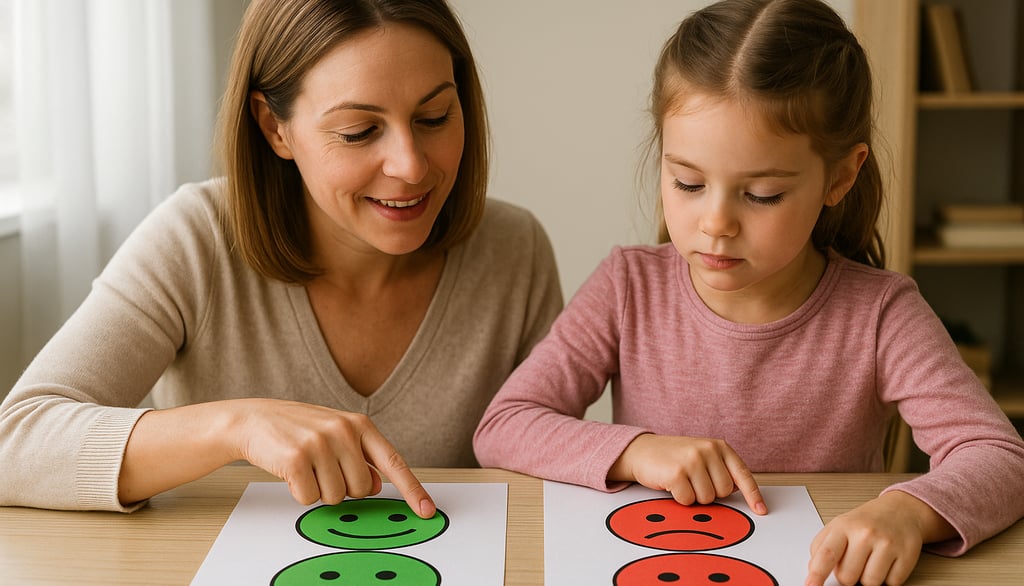Boosting Emotional Awareness in Children with IREADalot
Labeling emotions cultivates emotional awareness, which fosters self-regulation and reduces impulsivity over time. IREADalot simple mood tracking builds emotional awareness in kids, teaches self-regulation, and strengthens parent-child connection — all with just a quick emoji tap.😊
8/6/20252 min read


Boosting Emotional Awareness in Children with IREADalot
Labeling emotions cultivates emotional awareness, which fosters self-regulation and reduces impulsivity over time. IREADalot simple mood tracking builds emotional awareness in kids, teaches self-regulation, and strengthens parent-child connection — all with just a quick emoji tap.😊
A study of elementary school students (ages 8–12) found that children with higher emotional awareness were less likely to use suppressive strategies and had significantly lower levels of depression, both immediately and over time (Frontiers).
A longitudinal study (ages 9–15) revealed that increased emotion differentiation and communication—key components of emotional awareness—were linked with decreases in anxiety and depression (SpringerLink).
Enhancing Emotion Regulation Through Reflection
Tracking mood twice—before and after reading—encourages children to reflect on how their emotional state changed.
A meta-analysis demonstrated that psychosocial interventions aimed at emotion regulation produce a small-to-medium positive effect (effect size d = 0.37) on emotion regulation in youth (SpringerLink).
Strengthening the Parent–Child Emotional Connection
Sharing mood states with parents opens a path for empathy, communication, and emotional coaching.
Emotion-focused parenting interventions improved parents' abilities to coach emotions and reduced children’s behavioral problems (Frontiers).
The concept of meta-emotion, where parents understand and respond to both their own and their children’s emotions, highlights how parents’ emotional awareness and coaching style profoundly influence their children (Wikipedia).
Reducing Parents’ Stress and Boosting Responsiveness
Parents gain clear, immediate insight into their child’s emotional experience, helping them respond proactively.
High parental stress is linked to negative outcomes in children, such as behavioral and academic problems, while increasing parenting stress also affects physiological health markers in both parent and child (Wikipedia).
The Power of Self-Monitoring
Even simple self-monitoring—like logging daily mood—can build emotional awareness and trigger positive self-regulation strategies.
Self-monitoring of mood has been shown to yield therapeutic outcomes, such as identifying emotional triggers and reinforcing coping strategies (ScienceDirect).
Summary
Feature Impact on Child Benefit for Parent Emoji-based mood tracking Develops emotional awareness and regulation Easy insight into child’s emotional shifts Before-and-after check-ins Makes emotional progress visible and reinforcing Sparks timely conversations and support Emotional coaching by parents Enhances self-regulation and emotional maturity Builds trust and improves parent responsiveness Self-monitoring the mood Encourages reflection and insight Helps parents track patterns and intervene early
References (click to explore)
Emotional awareness → lower depressive symptoms: (SpringerLink)
Longitudinal development of emotion awareness/regulation → reduced anxiety & depression: (SpringerLink)
Meta-analysis: interventions improve emotion regulation (d = 0.37): (SpringerLink)
Parenting intervention improves emotion coaching & child behavior: (Frontiers)
Meta-emotion framework: parent coaching matters: (Wikipedia)
Parenting stress impacts both child behavior and physical health markers: (Wikipedia)
Mood self-monitoring aids emotional insight and therapy: (ScienceDirect)

